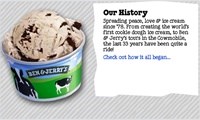
Top stories





Marketing & MediaBehind the campaign: Reframing fairness in ride-hailing: The inDrive success story
inDrive 6 hours

More news




















Crafting a coherent narrative can transform a business from an everyday brand into a globally recognised, sector-leading force.

Ben & Jerry's have mastered the art of telling a brand story. They don't just sell ice cream - they sell a 'world of ice cream euphoria'. The company's founding story - a tale of two enterprising friends selling home-made ice cream out of a VW campervan - is almost as famous as their unique flavour combinations.
Ben & Jerry's use storytelling as their main marketing method. The 'history' of each flavour is printed onto the company's iconic cartons, the website features an interactive timeline of the entire 'Cow to Cone' manufacturing process, and each director has uploaded a detailed profile.
The brand promotes a liberal and eco-friendly image, and is loved by fans around the world. However, many people are unaware that Ben Cohen and Jerry Greenfield sold the company to corporate giant Unilever back in 2000 - a testament to the power of storytelling.
Ice cream is associated with sunshine and happiness, and therefore lends itself well to storytelling. However, even dull products can support an exciting brand narrative.

Dyson is famous for manufacturing vacuum cleaners - not the most dynamic of products. Rather than following the typical advertising strategies of other cleaning aids, the company wisely opted for a different tactic.
Just as the story of Ben and Jerry captivated audiences, so did the tale of the company's founder, James Dyson. He famously created a staggering 5,127 prototypes of the Dyson vacuum cleaner in his home workshop, before finally announcing his creation to the world.
His story transformed him from a man into something almost mythical - inventor, entrepreneur, and perfectionist. It demonstrates the company's core values of skill, dedication, and innovation - values which are also reflected in Dyson's product range.
The power of storytelling has turned Dyson into the most respected technology brand in its home country - a benchmark by which other companies are measured.
Both of these companies have successfully harnessed the power of storytelling. No other ice cream brand inspires such loyalty and passion as Ben & Jerry's, and Dyson vacuum cleaners have long been synonymous with quality.
Extensive research has shown that the human brain is designed to be receptive to storytelling. When we hear a story, sections of our brain react as though they actually experiencing the events being described.
Researchers believe this phenomenon may help us to improve our social skills. However, it can also be harnessed by marketers. By stimulating the brain, stories can influence our emotions. And - crucially - emotion is one of the driving forces behind buying decisions.
A consumer-brand interaction is rarely a one-time occurrence. People build up a history of their interactions with a company, weaving a narrative of experience. A good brand experience - such as feeling inspired by the tale of a philanthropic CEO - will remain in the consumer's mind, potentially persuading them to choose one product over another at a later date.
Every business needs a core set of defining values, which should be conveyed in your brand narrative. The most successful companies create their own unique personality, which embodies everything they stand for.
These values need to be crystal clear to your potential customers. It's best to pick a handful of powerful values - being vague or complicated will only confuse your brand story.
The need for clarity is something Marks & Spencer is beginning to understand. M&S sell both food and clothing, and have been a feature on British high streets for decades.
Their food range has a clear brand narrative, standing for quality, flavour, and class. As a result, their food department has enjoyed a consistent sales growth in recent years.

However, in 2010 it was revealed that clothing sales were lower than they had been for ten years - and have continued to shrink ever since.
Part of the problem stems from their confusing brand story. Marks & Spencer offer a large number of different clothing ranges, each with their own target audience and values. These conflicting narratives have blurred customer understanding, leading to a drop in sales.
Consistency is vital when crafting a brand narrative. Thorough research of your target market is essential - once you've sold your customers a story, it's very difficult - although not impossible - to rebrand with something different. Ultimately, brand narratives are memorable, and can help your products stand out from the competition. Don't underestimate the power of storytelling - it could transform your business.
